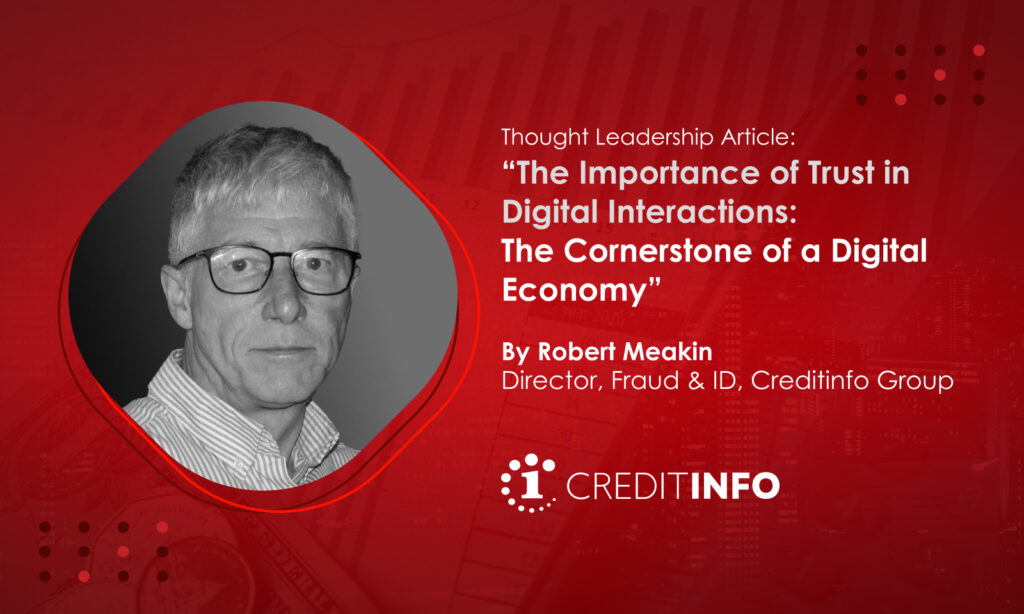Creditinfo and NOTO partner to expand market access to modern fraud and AML controls for banks, fintechs and lenders

Collaboration combines data and tech to strengthen financial crime prevention
12th November 2025 – Creditinfo, a global provider of credit risk and data intelligence, and NOTO, an enterprise platform for fraud prevention and anti-money laundering (AML), today announced a partnership to bring modern, data-rich financial crime controls to banks, fintechs and lenders across multiple markets. The agreement pairs Creditinfo’s in-market coverage and data expertise with NOTO’s adaptable decisioning and case-management platform, aiming to enhance risk controls while preserving a seamless customer experience.
Financial institutions continue to face higher fraud losses, sharper regulatory scrutiny, and a highly dynamic environment that demands greater agility, while onboarding speed expectations continue to rise. The partnership focuses on measurable outcomes – stronger KYC and screening, better detection and monitoring, and streamlined investigations – delivered in a way institutions can roll out and scale without major IT upheaval.
Partnership highlights:
- Market access + enablement: Creditinfo distribution and NOTO technology delivered together, enabling faster rollout
- Outcome focus: Will reduce fraud losses and false positives, strengthen AML readiness, and shorten time from pilot to production.
- Operational fit: Simple to deploy where it will have the most impact then extend across the lifecycle as requirements evolve.
Rob Meakin, Fraud and Identity Director at Creditinfo said: “Clients need practical improvements they can deploy and adapt quickly. By combining high-fidelity risk and trust signals from Creditinfo with NOTO’s agile, high capacity, low latency technology stack we’re giving financial institutions a balanced, risk-aware method of strengthening KYC, screening and monitoring that can be easily tailored to local conditions.”
Ivan Stefanov, CEO and Co-Founder at NOTO, said: “Creditinfo brings the data; NOTO turns it into decisions. Financial institutions don’t need another dashboard—they need decisions they can trust in milliseconds. By combining Creditinfo’s depth of bureau and alternative data with NOTO’s real-time risk decisioning, we give clients a single risk view across onboarding, fraud, and AML. The result: Less financial crime. More business.”
The joint offering is now available via Creditinfo and NOTO. Organisations can contact either company for details.
END.
About Creditinfo
Established in 1997 and headquartered in London, UK, Creditinfo is a provider of credit information and risk management solutions in over 30 countries worldwide. As one of the fastest-growing companies in its field, Creditinfo facilitates access to finance, through intelligent information, software, and decision analytics solutions.
About NOTO
NOTO is a modular, scalable, and adaptable platform for fraud prevention and AML compliance, built by experts to deliver measurable outcomes across the customer lifecycle.
The Importance of Trust in Digital Interactions: The Cornerstone of a Digital Economy

There’s a diversity in maturity in digitization across the globe – from markets that are almost universally digital, through markets with developing digital economies, to markets with embryonic digital ecosystems. Mature economies typically have more mature controls but remain attractive to fraudsters because of the scale of opportunity – emerging digital economies typically have less robust ecosystems and are attractive because of the inherent vulnerabilities in the controls – with a promise for future growth.
The anonymity and distance that digital platforms afford make it easier for fraudsters to operate undetected.
For bad actors, the business model is scalable – in a digital economy the unique skills of Frank Abagnale Jr (of “Catch Me If You Can” fame) become redundant. The ready availability of personal data through vast data breaches and social engineering, and online access to digital channels present an attractive proposition for the enterprising fraudster.
In fact, cybercrime has risen dramatically alongside digital transformation, with fraud rates increasing globally – and we’re increasingly seeing collaboration between cybercrime, fraud, organised crime and money laundering. Organizations face mounting challenges in protecting their digital infrastructure and customers from fraudulent activities. From identity theft to financial scams, fraudsters are leveraging a wide array of tactics to deceive individuals and organizations.
The digital economy’s vulnerability to fraud presents significant risks, not only for organizations, but also for consumers. When fraud occurs, it undermines the trust that is essential to the functioning of the digital economy. If consumers and businesses cannot trust the digital services they engage with, it will slow adoption, hinder growth, and damage reputations. Therefore, mitigating fraud risk is not just about protecting individual interactions – it’s about maintaining the integrity of the entire digital ecosystem.
The importance of trust in digital interactions cannot be overstated. From e-commerce to financial services and beyond, trust is the foundation upon which all successful digital interactions are built. At the core of this trust is the concept of identity verification. In a world where interactions are increasingly conducted online, it’s critical to ensure the presented identity is a real-world identity, not synthetic – and that the individual presenting the identity is the owner of that identity.
The need to assert identity in digital engagements goes beyond basic security – it forms the bedrock of confidence that drives the entire online ecosystem. Whether consumers are signing up for a new banking service, purchasing products, or enrolling in educational courses, verifying the authenticity of their identity is paramount. Identity verification serves not only to protect individuals but also to secure businesses from fraudulent activities, which, in turn, strengthens the broader digital economy.
The Role of Identity Verification in Mitigating Fraud Risk
At the heart of reducing fraud risk lies robust identity verification. This process ensures that the individual engaging with a digital platform is who they claim to be. It is a crucial step that lays the groundwork for every subsequent transaction, providing a layer of protection for both consumers and businesses. Without reliable identity verification, any digital interaction is susceptible to being manipulated by malicious actors.
Identity verification can be achieved through a variety of techniques, including biometric verification, document verification, and multi-factor authentication. These methods allow businesses to verify that a person is genuine, providing them with the confidence to proceed with transactions. This, in turn, enables a safer and more reliable digital environment for everyone involved.
However, while basic identity verification is a critical first step, it is only part of the solution.
The Power of Layering Fraud Defences
In a digital economy, an identity is far more than a name, address, date of birth and national id number.
From basic digital identity attributes such as mobile numbers, email addresses and IP addresses, through payment attributes such as bank details and credit card numbers, through connected messaging apps and service accounts, through device attributes such as screen size, make, model, time zone, location, installed apps, through biometric attributes such as facial patterns, to behavioural attributes such as physical device interactions. A digital identity is an extensive and interconnected web of many attributes.
The real strength in mitigating fraud risk lies in combining multiple layers of defence – a multifaceted approach that examines not only the traditional identity attributes, but the wider digital footprint and the connections between attributes across the identity graph. Consistency and conformity to normalised patterns help establish greater trust – inconsistency and anomalous patterns indicate greater risk. Machine learning and artificial intelligence techniques are increasingly used to examine attribute patterns – generating increasingly performant models.
The power of a layered approach lies in managing the balance between making life difficult for bad actors and removing friction in genuine interactions. In a digital economy consumers become increasingly intolerant of any friction in their interactions with organisations. Where consumers encounter even minor friction, they will abandon the sales process and look for alternative providers – in a competitive market, the winners will be the businesses who deliver the easiest way to interact – but without appropriate fraud defences, success will be short lived.
More accurate multifaceted risk assessments can be implemented based lighter data capture, drawing insights from a broad range of sources, reducing CX friction and abandonment, readily securing greater trust, more accurately exposing risk.
Summary
As the digital landscape continues to evolve, organizations must prioritize trust as the cornerstone of their interactions with consumers. Robust identity verification and a layered approach to fraud prevention are not just best practices – they are essential for maintaining the integrity of the digital economy. By effectively combining multiple layers of defence, businesses can balance security with convenience, reducing fraud risk without sacrificing customer experience. In the end, fostering trust in digital engagements is the key to enabling sustained growth and success in an increasingly complex and competitive online ecosystem.
For more information, please visit: www.creditinfo.com
or email info@creditinfo.com
Author : Robert Meakin – Director, Fraud & ID, Creditinfo Group
Creditinfo Launches New Global Fraud & ID Solution

Creditinfo’s new solution supports clients in mitigating the impact of fraud and supporting organisational growth.
London – 27th March 2025: Creditinfo, a global service provider for credit information and risk management solutions, has today announced the launch of its global identity, know your customer (KYC), and fraud and ID solution, set to help organisations tackle financial crime.
The overall global economic impact of financial crime has been estimated to be $5 trillion. What’s more, according to the 2024 Nasdaq global financial crime report, fraud losses totalled $485.6 billion worldwide, from fraud scams and bank fraud schemes alone. As such, organisations face a series of challenges, from eroding profit margins to reputational risks to data breaches. Creditinfo’s solution helps organisations to address these challenges by using credit bureau data, government information services, and other registries to establish trust in presented identities, without negatively impacting the customer experience.
The solution integrates identity proofing, digital risk signals and comprehensive international and domestic watchlists to deliver strong KYC compliance and reduce the risk of fraudulent activity. It also enables businesses to streamline risk management and ensures they meet stringent customer due diligence requirements under anti-money laundering (AML) regulations.
As a global solution, it is tailored to meet the unique needs and maturity-levels of different markets. By accounting for these differences, organisations that use the solution can adapt their fraud prevention strategies to specific local risks, strengthening security and promoting financial inclusion.
Creditinfo has appointed Rob Meakin as Director of Fraud & Identity to head up this service. He brings extensive experience in fraud prevention, identity management, and financial services. Meakin will lead efforts to help organisations counter fraud – leveraging advanced technologies and data analytics to enhance the customer experience and strengthen fraud and AML controls.
Rob Meakin, Director of Fraud and Identity at Creditinfo, said: “The growing presence of organised financial crime is significantly hindering economic growth on both a local and global scale, costing businesses huge sums of money each year – in fraud losses, lost sales and operational costs. That’s why, at Creditinfo, we’re pioneering a solution that provides a way for organisations to manage risk and maintain compliance while facilitating secure and easy access to financial products and services for consumers.”
John Cannon, Chief Commercial Officer at Creditinfo said: “By removing friction from both traditional and digital onboarding and origination processes, our solution helps organisations reduce fraud, improve conversion rates, and drive top-line growth while ensuring a seamless customer journey. As we strive to expand our global reach and enhance financial access for millions of consumers and businesses worldwide, having Rob join our team is an invaluable advantage, strengthening both our security capabilities and our ability to deliver innovative solutions.”
-END-
About Creditinfo
Established in 1997 and headquartered in London, UK, Creditinfo is a provider of credit information and risk management solutions worldwide. As one of the fastest-growing companies in its field, Creditinfo facilitates access to finance, through intelligent information, software and decision analytics solutions.
With more than 30 credit bureaus running today, Creditinfo has the most considerable global presence in this field of credit risk management, with a significantly greater footprint than competitors. For decades it has provided business information, risk management and credit bureau solutions to some of the largest, lenders, governments and central banks globally to increase financial inclusion and generate economic growth by allowing credit access for SMEs and individuals.
For more information, please visit www.creditinfo.com
For inquiries email rob.meakin@creditinfo.com
Download Brochure HereThe Know Your Customer (KYC) world and Creditinfo’s role in it.

The acronym KYC stands for three very simple and understandable words – Know Your Customer. But the meaning of the processes and expectations behind those three letters are most often not so simple and straightforward, as whoever must deal with this today already well-known acronym, knows that the world and the industry behind this magical acronym, is already vast and growing every day.
KYC in very essence means that you must have understanding and information of the background of your customer. Often this information is divided into three basic categories:
- Identification of the persons connected or operating behalf the customer.
- The field of activity or daily business including the understanding of the origin of the customers funds.
- The understanding if customer possesses certain risks while having any business relationships with him.
Mainly this sort of detective work is required in the purpose of mitigation the risks in anti-money-laundering/fight against terrorism financing (AML/CTF) but it is also relevant in the process of imposing international sanctions as sanctioned persons are interested that their business interest would remain undiscovered.
Even companies that are not subject to AML regulation need to ensure that they stay out of trouble caused by risks that are risen because of partners or clients with fraudulent, criminal, or sanctioned background, as this may result with loss of revenues/funds, bad business reputation or fines by authorities.
So therefore, it is essential for market entities to trust their business affiliates and therefore they need to verify that everything is OK with their customers and threat of the damage caused by realization of different risks, is minimized.
What is happening in Europe to strike this conversation now?
One very practical side for knowing your customer is to be sure that you’re not violating any sanctioning regime in force. Sanctions and sanctioning regimes may not be familiar to all of us who we just are involved our day-to-day business, but this obligation is something we all must know and follow. International sanctions are seen as sort of political means for influencing certain group of entities, jurisdictions, or organizations to behave in line to accordance with the international human rights, rules of law and territorial integrity. Sanctions are imposed in a way that all private and legal entities are obliged to fulfill them, authorities who are imposing them are usually international organizations (EU, UN) or state governments.
As Russia launched massive war campaign in Ukraine in February 2022 and has performed several actions against Ukraine’s territorial integrity already from year 2014 this kind of behavior has naturally found a reflection from EU by imposing sanctions. As from 2014 there was already two regimes in force (regulations EU No 269/2014 and No 833/2014) it was easy on 2022 to EU to add several sanctioning updates (altogether by 8 packets) against Russia (and Belarus).
As the conflict remains in Ukraine and also as there are several war crimes discovered performed by Russian troops during the occupation of Ukraine, we can be more than certain that EU will impose more updates to Russian sanctioning regimes. This only intensifies the need for market entities to have a clear understanding on what are the situation regarding the restrictive measures in force and where to find that information.
How is CREDITINFO playing a role in this?
Mitigating the risks is always the question of having updated and trustworthy information that person must have for making decisions and enforcing correct procedures. Regarding risk mitigation and imposing enforced sanctioning regimes clients often face themselves in front of different questions –
- What exactly do they have to do?
- How do they do it?
- Where can they find help and trustful partner for this?
- Are the solutions for doing it comfortable and simple to use?
- How expensive is it?
Providing both, the trustworthy information from respectful sources and the solution for being compliant in the regards to that obligation (by using Creditinfo-offered solution) is one of the ways of building up successful client relationship in KYC sector (obligations in KYC area may differ depending on the AML/TFC and imposing sanctions viewpoint). KYC procedures regarding sanctions can be divided into two different service blocks:
- Identifying the persons behind and connected to legal entity.
- Easy to use, reliable screening solution for determining whether there are imposed sanctions or not.
It is important to have flexible products in place for meeting the needs for most of the market entities as clients tend to prefer to order all the solutions from one place. For example, clients may have the need only for determining certain persons connected with legal entities (like UBO’s), other clients may only need data sources for setting up internal screening procedures for their inter-company use, while others are just willing to outsource everything (analysis, data and screening).
Lastly, instead of being in the last mile lets be the first! As already mentioned, there are different market entities who are operating in KYC business, and they are all seeking for cost efficient and trusted data sources for providing best data quality with best price to their customers. Creditinfo Group’s presence in several different countries, with the direct access to local state registry information or other base data source in those countries therefore makes us one of the trusted partners for well-known global companies.
KYC products are in process of continuous development and as the needs for our clients change, we need to align our services accordingly. If there are ideas, proposals, or questions, please feel free to reach me via email – urmas.pai@creditinfo.com
Urmas Pai
KYC & Fraud Global Product Manager
Fraud Risk Assessment, the Process, getting it right

Nolan Williams is a consultant and global expert in Operational, safety, security and Fraud risk management services. On Thursday, 25th February 2016 we had a pleasure to introduce him as a speaker of Creditinfo Academy.




